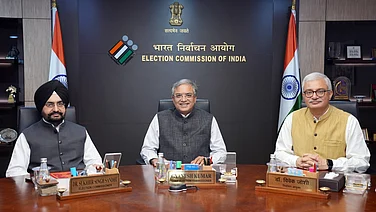External Affairs Minister S Jaishankar has said India faces a "very complicated challenge" from China, and the Narendra Modi government has taken steps to ensure no attempts are made to change the status quo in the border areas unilaterally.
This challenge was "very visible" in border areas in the last three years, Jaishankar said on Saturday, adding that both the countries have to find an equilibrium in relationship, but it cannot be on the terms of the other party.
If peace and tranquillity between the two nations is disturbed, their relationship will not remain unaffected, the minister said, delivering a talk on 'Modi's India: A Rising Power' at the Anant National University here.
"When I talk about big powers, of course we have a particular challenge from China. That challenge is a very complicated challenge, but in the last three years it has been particularly visible in the border areas," Jaishankar said, apparently referring to China's incursions in eastern Ladakh.
"There are clearly responses that are required, and those responses have been undertaken by the government. And a lot of it to ensure that no attempt is made to unilaterally change the status quo in the border areas," he said. The two countries will have to find some kind of equilibrium, and all the past governments in their own ways tried to find a balance, the External Affairs Minister said.
"But that balance cannot be on the terms of the other party. Then it is not a balance. There has to be something mutual," he said. Mutual respect, sensitivity and interest have to be the basis of the relationship, Jaishankar said.
"How can we get along long term if you don't respect me, if you are not sensitive to my concerns, if you ignore my interest?" he said, adding that if India sees respect, sensitivity and recognition, it can think of a better relationship with China. "But if we do not, I think we need to stand up for our rights, and we need to be firm in asserting opposition. And that, unfortunately, currently is the situation," he said.
Talking about India under Prime Minister Narendra Modi, Jaishankar stressed on the strengthening of relationship with immediate and extended neighbouring countries. Neighbours like Bangladesh, Nepal and Bhutan, which have always been close to India, are today linked with us through roads, railway, waterways and electricity grid connections, he said.
"The linkage and perception today of India in the neighbourhood has changed, and nothing illustrated that more dramatically than what happened to Sri Lanka last year when it went through a very deep economic crisis," he said.
"And we have actually stepped forward in a way in which we ourselves never have before. What we have done for Sri Lanka is bigger than what the IMF has done for Sri Lanka," he said. The Rajya Sabha member from Gujarat also said the Modi government is trying to expand the neighbourhood.
"When I speak of the neighbourhood, I think a big change of our Indo-Pacific...strategically, what happens there concerns us very much. At the same time, there are other big changes happening, changes which include the rise of China, which includes, in a way, how the US has become much more cautious about its own commitments," he said.
The Quad countries are today discussing maritime collaboration, infrastructure connectivity, 5G and vaccines, among other issues. India is also interacting with a group of countries to its West, such as Israel, United States and United Arab Emirates, Jaishankar said.
"Under PM Modi, we are not thinking just of tomorrow, we are not even thinking of the next term. We are thinking really beyond. And in many ways, without exaggerations, we are today laying the foundation of what is the global footprint," he said. The rise of India has a very special significance in the world as the only comparable rise was that of China, Jaishankar said.


























